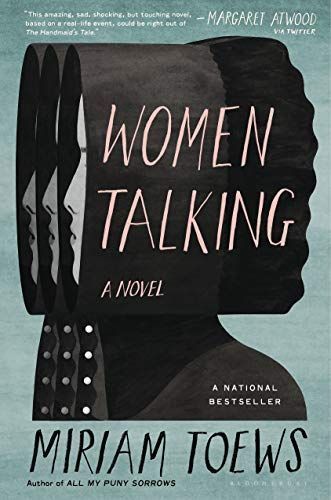
Women Talking
NAMED ONE OF THE MOST ANTICIPATED BOOKS OF 2019 BY ENTERTAINMENT WEEKLY * VULTURE * BUZZFEED * BOSTON GLOBE * AV CLUB's * NYLON * MEDIUM * THE MILLIONS * HUFFINGTON POST * THE RUMPUS * LIT HUB * PUBLISHERS WEEKLY * THE WEEK * AM New York “This amazing, sad, shocking, but touching novel, based on a real-life event, could be right out of The Handmaid's Tale.” --Margaret Atwood, on Twitter One evening, eight Mennonite women climb into a hay loft to conduct a secret meeting. For the past two years, each of these women, and more than a hundred other girls in their colony, has been repeatedly violated in the night by demons coming to punish them for their sins. Now that the women have learned they were in fact drugged and attacked by a group of men from their own community, they are determined to protect themselves and their daughters from future harm. While the men of the colony are off in the city, attempting to raise enough money to bail out the rapists and bring them home, these women--all illiterate, without any knowledge of the world outside their community and unable even to speak the language of the country they live in--have very little time to make a choice: Should they stay in the only world they've ever known or should they dare to escape? Based on real events and told through the “minutes” of the women's all-female symposium, Toews's masterful novel uses wry, politically engaged humor to relate this tale of women claiming their own power to decide.
Reviews
Regan Martin@regsmartin
katie h.@caterhine
Alex Reino@atr
Chris Dailey@cris_dali
Ryan Mateyk@the_rybrary
Kate B-L@librarycard
C@chembotss
Jay Harris@jayharris
Cassie B@partialtruth
Robyn Claridge@robynclaridge
Emily McMeans@emilymcmeans
erin alise @thehollowvalley
Tove Söderberg@tlsouthmountain
Apiecalypse Jen@chippedfang
Jeannette Ordas@kickpleat
Fraser Simons@frasersimons
Dani Gale@danimariega
Jordan Robinson@jordalinereads
Emily C Peterson@etrigg
Cindy@cindypepper
Anyaconda@kaffeeklatschandbooks
alyssa cantu@ancantu
Ali Angco@aliangco
Guinevere Filiaggi@gff
Highlights
sina (she/her) @sina
Page 149
sina (she/her) @sina
Page 5
Emily McMeans@emilymcmeans
Page 116
Emily McMeans@emilymcmeans
Emily McMeans@emilymcmeans
Page 28
Emily McMeans@emilymcmeans
Page 7
erin alise @thehollowvalley
Page 128
erin alise @thehollowvalley
Page 2
Steffi Colberg@steffiwhatever
Page 214
Steffi Colberg@steffiwhatever
Page 214
Steffi Colberg@steffiwhatever
Page 202
Steffi Colberg@steffiwhatever
Page 142
Steffi Colberg@steffiwhatever
Page 124
Steffi Colberg@steffiwhatever
Page 60
Steffi Colberg@steffiwhatever
Page 28
Steffi Colberg@steffiwhatever
Page 27
Steffi Colberg@steffiwhatever
Page 26
Steffi Colberg@steffiwhatever
Page 9